|
|
|
Sort Order |
|
|
|
Items / Page
|
|
|
|
|
|
|
| Srl | Item |
| 1 |
ID:
138822
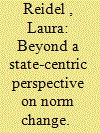

|
|
|
|
|
| Summary/Abstract |
This article argues that constructivist literature on norm diffusion could benefit from using a multilevel governance perspective. The case study is a retreat from the multicultural approach to governing state-minority relations in liberal democratic states, focusing on Canada and the Netherlands. It argues that, although actors at the national level may be retreating from the norms underlying this multicultural approach, this is not true of the substate and suprastate levels. Instead, in both countries, there is evidence of work at these levels to maintain these norms.
|
|
|
|
|
|
|
|
|
|
|
|
|
|
|
|
| 2 |
ID:
070226


|
|
|
| 3 |
ID:
128946


|
|
|
|
|
| Publication |
2014.
|
| Summary/Abstract |
In this article we set out a fine-grained measure of the formal authority of intermediate subnational government for Indonesia, Malaysia, the Philippines, South Korea, and Thailand that is designed to be a flexible tool in the hands of researchers and policymakers. It improves on prior measures by providing annual estimates across ten dimensions of regional authority; it disaggregates to the level of the individual region; and it examines individual regional tiers, asymmetric regions, and regions with special arrangements. We use the measure and its elements to summarize six decades of regional governance in Southeast Asia and conclude by noting how the Regional Authority index could further the dialogue between theory and empirics in the study of decentralization and democratization.
|
|
|
|
|
|
|
|
|
|
|
|
|
|
|
|
| 4 |
ID:
123009
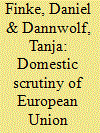

|
|
|
|
|
| Publication |
2013.
|
| Summary/Abstract |
Some European law proposals are subject to scrutiny by national parliaments while others go unchecked. The analysis in this article indicates that the opposition scrutinises European Union law to gather information on the proceedings inside the Council of Ministers and the European Parliament. Yet whereas strong opposition parties scrutinise highly politicised law proposals, weak opposition parties tend to scrutinise those proposals that are negotiated under the non-transparent fast-track procedure. In addition, there is ample evidence that the leading minister initiates scrutiny in order to strengthen his or her intergovernmental bargaining leverage. Yet, this Schelling Conjecture presumes that the party of the minister is located between the expected bargaining position in the Council and the coalition partner. Any other domestic interest constellation could lead to scrutiny motivated by whistle blowing. However, an issue's salience helps us to separate the whistle blowing from the Schelling Conjecture.
|
|
|
|
|
|
|
|
|
|
|
|
|
|
|
|
| 5 |
ID:
117741


|
|
|
|
|
| Publication |
2012.
|
| Summary/Abstract |
There has been increasing consciousness among the government institutions of Bangladesh about social protections as measures to protect people from becoming trapped into poverty. The country has therefore, been conducting series of Social Safety Net Programmes (SSNPs) to implement social protections for addressing the needs of the poor and the vulnerable people. These SSNPs range from relief supports for the victims of natural disasters to health and sanitation services, microfinance for rural women, and legal services for establishing citizens' rights. However, with the absence of multilevel governance in the social, political, and economic sectors of Bangladesh, the extensity of social disparity and inequality remained persistently the same. This is an important issue for a country like Bangladesh where social disparity exists both in agency and structure in which both formal and informal political, economic, social, and cultural institutions are restricting people's participation on the basis of wealth, power, and identity. Therefore, while the social protection policies and programmes have greater resonances in Bangladesh, the poorest and the vulnerable communities have not been benefited that much yet. The paper attempts to explore the emerging need for multilevel governance for the social safety net measures in Bangladesh ranging from policy formulations to implementations in effective ways. The paper addresses governance deficits and delineates the need for multilevel governance in Bangladesh. It is argued that administering SSNPs through traditional governance approaches suffer from inefficiency and specificity, thus generate a good deal of debate regarding the sustainability and impacts of SSNPs in Bangladesh. And for some functions associated with the proper delivery of social safety net programmes in Bangladesh, multilevel governance set up is more well suited.
|
|
|
|
|
|
|
|
|
|
|
|
|
|
|
|
| 6 |
ID:
178027
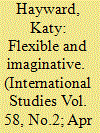

|
|
|
|
|
| Summary/Abstract |
The 1998 Good Friday (Belfast) Agreement that cemented the peace process formalized Northern Ireland’s position as a region integrally connected to both Great Britain and the Republic of Ireland. The multilevel governance and cross-border cooperation this entailed was enabled by common UK and Irish membership of the European Union. The UK’s decision to leave the EU posed risks to this settlement. In response, they engaged in a quest for ‘flexible and imaginative solutions’ to this conundrum. The unique arrangements established through the Protocol on Ireland/Northern Ireland in the UK–EU Withdrawal Agreement (2019) mark an innovative and ambitious development for the EU. First, it de facto includes a region of a non-member state within its internal market for goods and, second, it delegates the enforcement of its rules to that non-member state. The Protocol represents a significant departure for the EU in terms of its typical engagement with external actors. Most significantly, it will not only represent a ‘live’ concern for the EU but a unique type of responsibility.
|
|
|
|
|
|
|
|
|
|
|
|
|
|
|
|
| 7 |
ID:
184095


|
|
|
|
|
| Summary/Abstract |
Over the past few decades, cities have become increasingly active in global climate governance. Although most research on city agency has focused on democratic (often Western) cities, the climate-related activities of Chinese cities in global city networks have also expanded, raising the question of whether cities from nondemocratic political systems can be international actors or whether they are merely extensions of their national governments. This article examines how the Chinese Party-state’s institutions and governing instruments shape cities’ global agency and how these structures impact the work of various city networks operating in China. To this end, it analyzes policy reports, documents, and original interview data collected from city network representatives. The findings demonstrate that city networks in China walk a fine line between their door-opening function for cities to global climate governance and their role as transmitters of the central government’s gatekeeping function, thereby sustaining the hierarchical control structures of the Chinese Party-state.
|
|
|
|
|
|
|
|
|
|
|
|
|
|
|
|
| 8 |
ID:
085325


|
|
|
|
|
| Publication |
2008.
|
| Summary/Abstract |
Public policy on water has long been approached in the context of a locality, a country, or a river basin. However, scientific evidence now provides compelling arguments for adopting a global perspective on water management. This article argues that water governance today needs a multilevel design, including a significant global dimension. The discussion defines global water governance, highlights the implications for multilevel governance, and examines global water governance through the lens of governance typologies. The analysis along the categories of globalization/regionalization, centralization/decentralization, formality/informality, and state/nonstate actors and processes reveals that current global water governance is a fragmented, mobius-web arrangement. The article concludes by considering possible future trajectories of global water governance.
|
|
|
|
|
|
|
|
|
|
|
|
|
|
|
|
| 9 |
ID:
163651
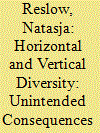

|
|
|
|
|
| Summary/Abstract |
Unintended consequences arising from EU external migration policy are a result of the multi-actor nature of this policy and of policy interactions. In addition, scholars face serious methodological challenges in establishing what the EU’s ‘intent’ is in external migration policy and, therefore, in determining which consequences are intended and which are unintended. The literature on the implementation and evaluation of EU external migration policy is in its infancy, and future work should take into account all policy outcomes – both those that were intended and those that were not.
|
|
|
|
|
|
|
|
|
|
|
|
|
|
|
|
| 10 |
ID:
133787
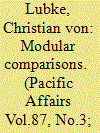

|
|
|
|
|
| Publication |
2014.
|
| Summary/Abstract |
This paper argues that analytical tensions between comparability and distinctiveness, which often drive a wedge between disciplinary and area-studies debates, are not irreconcilable. Drawing on original research of public governance in Southeast Asia, I contend that modular comparisons-which blend different levels of analytical scope and abstraction-offer a valuable methodological instrument for cross-fertilizing empirical depth and breadth. To showcase modular comparisons in practice, I present four interconnected studies of public governance in Southeast Asia. The analysis combines in-depth city-level analyses and subnational cross-sections (that draw heavily on Indonesia's multilevel governance experience) with an intraregional governance comparison (that expands the focus towards the Philippines and Thailand). To shed further light on "what makes governments work," the discussion traverses micro/macro-level confines and within-case/cross-case boundaries. In doing so, the concept of modular comparisons provides a systematic and contextually grounded perspective on Southeast Asian governance and a means for narrowing prevailing area-discipline divides.
|
|
|
|
|
|
|
|
|
|
|
|
|
|
|
|
| 11 |
ID:
132639
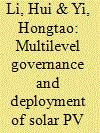

|
|
|
|
|
| Publication |
2014.
|
| Summary/Abstract |
Solar photovoltaic (PV) installations have been growing rapidly in the United States over the last few years, incentivized by policies from federal, state and local governments. The complex relationships between solar policies at multiple levels of government and solar deployment are questions of importance to policy makers and scholars. Extant literature on solar policies pays less attention to the role of local governments and policies than to their federal and state counterparts. Local governments and policies play indispensable roles in the deployment of solar PVs. This paper studies the multilevel governance of solar development in the U.S. by evaluating the relative effectiveness of state and local policy tools in stimulating solar PV installations, with an emphasis on local solar policies. With a regression analysis on a national sample of 186 U.S. cities, we find that cities with local financial incentives deploy 69% more solar PV capacities than cities without such policies. We also find that cities subject to RPS requirements have 295% more solar PV capacity, compared with cities not regulated by state RPS.
|
|
|
|
|
|
|
|
|
|
|
|
|
|
|
|
| 12 |
ID:
115101
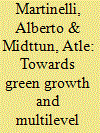

|
|
|
| 13 |
ID:
175402
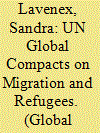

|
|
|
|
|
| Summary/Abstract |
As process-oriented, inclusive, legally nonbinding frameworks deemed to promote cooperation in the pursuit of agreed objectives, the Global Compacts for Migration and Refugees adopted in December 2018 introduce modes of experimentalist governance in fields where states have hitherto opposed (new) multilateral commitments. This article retraces the introduction of experimentalist elements in the compacts’ architecture and critically discusses their potential and limits in such contested policy fields. It concludes that given the depth of normative and distributive conflicts, the compacts are unlikely to generate substantive innovation, as experimentalist theory would suggest. They may, however, help to counter the erosion of existing commitments.
|
|
|
|
|
|
|
|
|
|
|
|
|
|
|
|
|
|
|
|
|